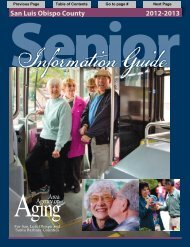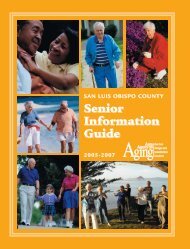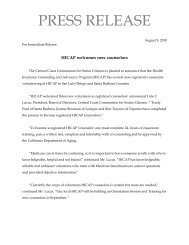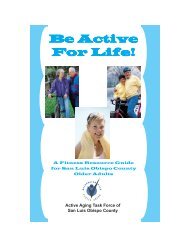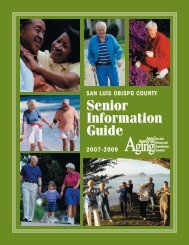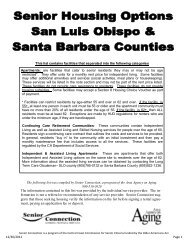Senior Resource Directory Senior Resource Directory
Senior Resource Directory Senior Resource Directory
Senior Resource Directory Senior Resource Directory
You also want an ePaper? Increase the reach of your titles
YUMPU automatically turns print PDFs into web optimized ePapers that Google loves.
arely admit feelings of de pres sion.<br />
Often they in cor rect ly attribute<br />
their depressive symp toms to<br />
physical ailments, and either<br />
ignore them or seek in ap pro pri ate<br />
treatment for their perceived illness,<br />
when they really need mental<br />
health care. Treatment for depression<br />
should always be preceded by<br />
a thor ough physical exam to rule<br />
out medical con trib ut ing factors.<br />
Depression may accompany many<br />
of the illnesses that affl ict older<br />
persons, such as Parkinson’s Disease,<br />
cancer, arthritis, strokes, and<br />
the early stages of Alzheimer’s and<br />
other neurological diseases. Treating<br />
depression in these situations<br />
can reduce unnecessary suffering<br />
and help affl icted in di vid u als cope<br />
with their medical problems. Medications<br />
taken by older persons or<br />
inadequate diets, often a problem<br />
of older individuals who live alone,<br />
can also cause depression as a<br />
side effect. Alcohol is a depressant<br />
itself, con trib utes greatly to the<br />
de pressed mood of the person. Depression<br />
in its residual form may<br />
be missed di ag nos ti cal ly because<br />
the person is not longer tearful.<br />
Careful observation by a knowledge<br />
able person, in addition to<br />
so phis ti cat ed medical evaluation,<br />
may be necessary to identify the<br />
depressed older person. A phy si -<br />
cian or other mental health professional<br />
at tempt ing to dif fer en ti ate<br />
between dementia and depression<br />
may call on family mem bers or<br />
longtime friends for in for ma tion<br />
on the patient’s history, since the<br />
onset of de pres sion may be more<br />
sudden than the usual slow and<br />
gradual process of dementia. Also,<br />
the individual with organic problems<br />
typically minimizes loss of<br />
mental function such as memory<br />
while the depressed person exaggerates<br />
the loss. It is pos si ble for<br />
a person to have de pres sion and<br />
another brain insult.<br />
MENTAL HEALTH/COUNSELING<br />
The experience of changes in<br />
mood or the workings of the mind<br />
should never be assumed to be the<br />
result of the normal process of<br />
aging - they are always a sign that<br />
something is wrong with a person’s<br />
health and that the individual<br />
needs medical help. The majority<br />
of the mental health prob lems of<br />
older adults are treatable and reversible.<br />
As is true with any illness,<br />
the earlier the treat ment of mental<br />
health problems takes place, the<br />
more likely it is that the individual<br />
will regain the capability of living a<br />
normal life. Again, the ap pear ance<br />
of be hav ior, thought, or emotional<br />
problems are not a normal experience<br />
in later life. There is no justifi<br />
cation for anyone of any age to<br />
suffer needlessly from depression<br />
or other mental health problems<br />
because of lack of treat ment. Older<br />
persons respond to treat ment as<br />
well as younger persons.<br />
Information on Depression is<br />
re print ed in part from “Depressive<br />
Illness: Treatments Bring New<br />
Hope” (US Department of Health<br />
and Human Services Public Health<br />
Service, Alcohol, Drug Abuse and<br />
Mental Health Ad min is tra tion).<br />
The Grieving Process<br />
Grief is a natural accompaniment<br />
to any signifi cant loss in our lives.<br />
The grieving process may include<br />
a feeling of shock or numbness, anger<br />
or irritation, fear or anxiety in<br />
addition to sadness. Having these<br />
feelings after the loss of a loved<br />
one is natural.<br />
The more losses that occur for an<br />
in di vid u al in a short period of time<br />
the more diffi cult to grieve as one<br />
never recovers before the next loss<br />
occurs.<br />
Feelings associated with grieving<br />
are also common around other<br />
losses as well; for example, retirement<br />
(loss of job, social status, role<br />
as provider, level of income) or illness<br />
(loss of ability to function as<br />
before, loss of mobility, of physical<br />
stamina or energy, loss of certain<br />
activities and social contacts). Loss<br />
of a pet to a person with limited<br />
social contacts or “family” can be<br />
traumatic.<br />
Taking on the role of becoming a<br />
caregiver to a disabled or ill spouse<br />
or other family member can also<br />
trigger feelings of anger, fear or<br />
sadness. As the caregiver copes<br />
with the loss of the kind of relationship<br />
s/he used to have with the<br />
person now cared for, loss of free<br />
time or of activities in the com mu -<br />
ni ty, many feelings may arise, some<br />
un wel come or even over whelm ing.<br />
This is exacerbated by the heavy<br />
phys i cal demands of caregiving.<br />
To help process normal feelings of<br />
grief and keep from getting stuck<br />
in de pres sion, it can be helpful to<br />
fi nd a group or in di vid u al who can<br />
support you in working with your<br />
feelings. If sadness turns into feelings<br />
of help less ness, hopelessness<br />
or emptiness and mean ing less ness,<br />
or persists over a long period of<br />
time, it may be im por tant to talk<br />
to a professional coun se lor. At<br />
times med i ca tion may be prescribed,<br />
under su per vi sion, to<br />
enhance mood as depression may<br />
result in neurotransmitter de ple -<br />
tion in the brain.<br />
Sharing Support<br />
Research (and common sense)<br />
suggest that there are certain<br />
steps that can be taken to en hance<br />
mental and emo tion al will-being.<br />
Primary among the ways to ensure<br />
a higher level of well being is peer<br />
support. We need other people<br />
to interact with to care about us<br />
and for us to care about. When<br />
some people feel badly, they want<br />
to isolate and keep it all inside.<br />
Getting to geth er with others who<br />
share your concerns and commit<br />
to taking positive steps to support<br />
each other can be very powerful<br />
medicine, although professional<br />
help may also be necessary.<br />
2005-2007 SANTA BARBARA COUNTY SENIOR RESOURCE DIRECTORY 75




